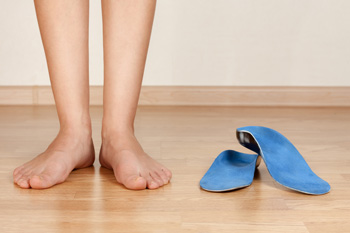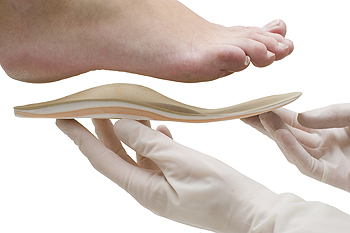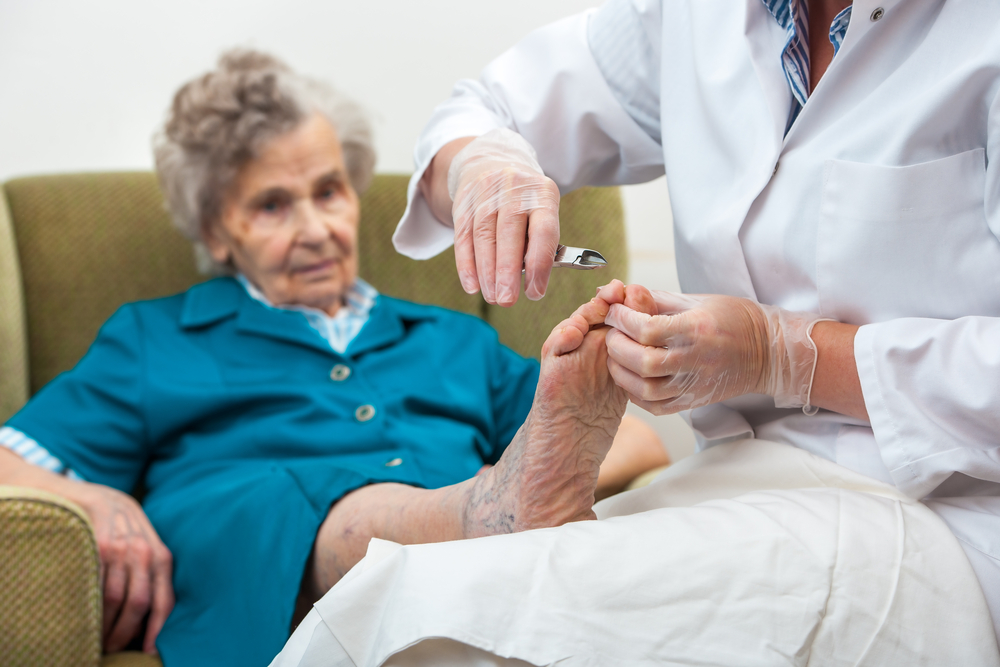October 2018
Intense Pain May Accompany Gout
 An excess of uric acid levels in the blood may lead to a painful condition known as gout. When the body has difficulty in processing this buildup, crystals will typically form in the joint of the big toe. It is often considered to be a form of arthritis, and may cause considerable pain and discomfort. This ailment may develop as a result of ingesting foods that are rich in purines, which may often include red wine, seafood or chocolate. Research has shown there may be several predispositions for gout to occur. People who have high blood pressure or who have abnormal kidney functions may be at a greater risk to develop this ailment. Patients who are afflicted with gout are aware of the intense pain, swelling and redness that accompanies this predicament. If you have developed gout it's suggested to consult with a podiatrist who can provide valuable information about the treatment of this debilitating condition.
An excess of uric acid levels in the blood may lead to a painful condition known as gout. When the body has difficulty in processing this buildup, crystals will typically form in the joint of the big toe. It is often considered to be a form of arthritis, and may cause considerable pain and discomfort. This ailment may develop as a result of ingesting foods that are rich in purines, which may often include red wine, seafood or chocolate. Research has shown there may be several predispositions for gout to occur. People who have high blood pressure or who have abnormal kidney functions may be at a greater risk to develop this ailment. Patients who are afflicted with gout are aware of the intense pain, swelling and redness that accompanies this predicament. If you have developed gout it's suggested to consult with a podiatrist who can provide valuable information about the treatment of this debilitating condition.
Gout is a painful condition that can be treated. If you are seeking treatment, contact one of our podiatrists from Accent Podiatry Associates. Our doctors will treat your foot and ankle needs.
What Is Gout?
Gout is a form of arthritis that is characterized by sudden, severe attacks of pain, redness, and tenderness in the joints. The condition usually affects the joint at the base of the big toe. A gout attack can occur at any random time, such as the middle of the night while you are asleep.
Symptoms
- Intense Joint Pain - Usually around the large joint of your big toe, and it most severe within the first four to twelve hours
- Lingering Discomfort - Joint discomfort may last from a few days to a few weeks
- Inflammation and Redness -Affected joints may become swollen, tender, warm and red
- Limited Range of Motion - May experience a decrease in joint mobility
Risk Factors
- Genetics - If family members have gout, you’re more likely to have it
- Medications - Diuretic medications can raise uric acid levels
- Gender/Age - Gout is more common in men until the age of 60. It is believed that estrogen protects women until that point
- Diet - Eating red meat and shellfish increases your risk
- Alcohol - Having more than two alcoholic drinks per day increases your risk
- Obesity - Obese people are at a higher risk for gout
Prior to visiting your podiatrist to receive treatment for gout, there are a few things you should do beforehand. If you have gout you should write down your symptoms--including when they started and how often you experience them, important medical information you may have, and any questions you may have. Writing down these three things will help your podiatrist in assessing your specific situation so that he or she may provide the best route of treatment for you.
If you have any questions, please feel free to contact our offices located in Arlington and Mansfield, TX . We offer the newest diagnostic and treatment technologies for all your foot care needs.
Read more about GoutIt's Time for Beautiful Feet
Why do Stress Fractures Develop?
 If you enjoy the sport of running or jogging, you may develop a stress fracture. This may gradually occur from the frequent repetitive motion that accompanies this type of activity. Despite the fact that many people who engage in sports may endure the discomfort of a stress fracture, certain individuals may be prone to developing this ailment. This may include having a medical condition that may weaken the bones, or experiencing a disorder that may affect the nerves. This may result in a loss of feeling. The pain that is associated with this condition may not be felt. The noticeable symptoms may include pain and discomfort and may be more intense in one foot. After an MRI or bone scan is performed, the proper treatment options can be discussed, such as possibly wearing a cast or boot or taking certain medications. Please consult with a podiatrist if you have endured a stress fracture and would like information about correct treatment techniques that are right for you.
If you enjoy the sport of running or jogging, you may develop a stress fracture. This may gradually occur from the frequent repetitive motion that accompanies this type of activity. Despite the fact that many people who engage in sports may endure the discomfort of a stress fracture, certain individuals may be prone to developing this ailment. This may include having a medical condition that may weaken the bones, or experiencing a disorder that may affect the nerves. This may result in a loss of feeling. The pain that is associated with this condition may not be felt. The noticeable symptoms may include pain and discomfort and may be more intense in one foot. After an MRI or bone scan is performed, the proper treatment options can be discussed, such as possibly wearing a cast or boot or taking certain medications. Please consult with a podiatrist if you have endured a stress fracture and would like information about correct treatment techniques that are right for you.
Stress fractures occur when there is a tiny crack within a bone. To learn more, contact one of our podiatrists from Accent Podiatry Associates. Our doctors can provide the care you need to keep you pain free and on your feet.
How Are They Caused?
Stress fractures are the result of repetitive force being placed on the bone. Since the lower leg and feet often carry most of the body’s weight, stress fractures are likely to occur in these areas. If you rush into a new exercise, you are more likely to develop a stress fracture since you are starting too much, too soon. Pain resulting from stress fractures may go unnoticed at first, however it may start to worsen over time.
Risk Factors
- Gender – They are more commonly found in women compared to men.
- Foot Problems – People with unusual arches in their feet are more likely to develop stress fractures.
- Certain Sports – Dancers, gymnasts, tennis players, runners, and basketball players are more likely to develop stress fractures.
- Lack of Nutrients – A lack of vitamin D and calcium may weaken the bones and make you more prone to stress fractures
- Weak Bones – Osteoporosis can weaken the bones therefore resulting in stress fractures
Stress fractures do not always heal properly, so it is important that you seek help from a podiatrist if you suspect you may have one. Ignoring your stress fracture may cause it to worsen, and you may develop chronic pain as well as additional fractures.
If you have any questions, please feel free to contact our offices located in Arlington and Mansfield, TX . We offer the newest diagnostic and treatment technologies for all your foot care needs.
Are Flat Feet Considered to be a Serious Condition?
 For many people, having flat feet may be a condition that generally causes little or no concern. When this condition occurs, the feet will lay flat on the ground as a result of an absent arch. Research has shown that most babies are born with flat feet, and the arches will typically develop at approximately six years of age. While flat feet or fallen arches do not hinder daily activities for many people, there may be symptoms that may cause discomfort for certain people. These may include the feet feeling stiff or experiencing a numbing sensation. Additionally, some people may have difficulty in balancing or walking, or one foot may possibly be affected. Possible treatment options may include wearing shoes that have a low heel, or using insoles in the shoes, which may offer adequate support. It’s suggested to speak with a podiatrist who can advise you on what the best treatment options are for you.
For many people, having flat feet may be a condition that generally causes little or no concern. When this condition occurs, the feet will lay flat on the ground as a result of an absent arch. Research has shown that most babies are born with flat feet, and the arches will typically develop at approximately six years of age. While flat feet or fallen arches do not hinder daily activities for many people, there may be symptoms that may cause discomfort for certain people. These may include the feet feeling stiff or experiencing a numbing sensation. Additionally, some people may have difficulty in balancing or walking, or one foot may possibly be affected. Possible treatment options may include wearing shoes that have a low heel, or using insoles in the shoes, which may offer adequate support. It’s suggested to speak with a podiatrist who can advise you on what the best treatment options are for you.
Flatfoot is a condition many people suffer from. If you have flat feet, contact one of our podiatrists from Accent Podiatry Associates. Our doctors will treat your foot and ankle needs.
What Are Flat Feet?
Flatfoot is a condition in which the arch of the foot is depressed and the sole of the foot is almost completely in contact with the ground. About 20-30% of the population generally has flat feet because their arches never formed during growth.
Conditions & Problems:
Having flat feet makes it difficult to run or walk because of the stress placed on the ankles.
Alignment – The general alignment of your legs can be disrupted, because the ankles move inward which can cause major discomfort.
Knees – If you have complications with your knees, flat feet can be a contributor to arthritis in that area.
Symptoms
- Pain around the heel or arch area
- Trouble standing on the tip toe
- Swelling around the inside of the ankle
- Flat look to one or both feet
- Having your shoes feel uneven when worn
Treatment
If you are experiencing pain and stress on the foot you may weaken the posterior tibial tendon, which runs around the inside of the ankle.
If you have any questions please feel free to contact our offices located in Arlington and Mansfield, TX . We offer the newest diagnostic and treatment technologies for all your foot and ankle needs.
Read more about Flat FeetThe Benefits of Using Orthotics
 Many people have chosen to use orthotics in their shoes for the primary reason of relieving pain and discomfort that may be associated with certain foot conditions. There may be many beneficial reasons for using orthotics including maintaining proper arch support, relieving uncomfortable pressure the feet may endure from daily activities, and to aid in diminishing heel pain. Research has shown that body weight may be easier to balance on the feet when the proper orthotics are used. A common reason to use orthotics may be overpronation, which is the term referred to when the foot rolls too far inward. If left untreated, it may cause a plethora of additional foot ailments, including bunions, calluses, and plantar fasciitis, which is an inflammation of the tissue that runs along the sole of the foot. If you would like additional information about orthotics, please consult with a podiatrist who can properly measure your foot for these devices.
Many people have chosen to use orthotics in their shoes for the primary reason of relieving pain and discomfort that may be associated with certain foot conditions. There may be many beneficial reasons for using orthotics including maintaining proper arch support, relieving uncomfortable pressure the feet may endure from daily activities, and to aid in diminishing heel pain. Research has shown that body weight may be easier to balance on the feet when the proper orthotics are used. A common reason to use orthotics may be overpronation, which is the term referred to when the foot rolls too far inward. If left untreated, it may cause a plethora of additional foot ailments, including bunions, calluses, and plantar fasciitis, which is an inflammation of the tissue that runs along the sole of the foot. If you would like additional information about orthotics, please consult with a podiatrist who can properly measure your foot for these devices.
If you are having discomfort in your feet and would like to try orthotics, contact one of our podiatrists from Accent Podiatry Associates. Our doctors can provide the care you need to keep you pain-free and on your feet.
What Are Orthotics?
Orthotics are inserts you can place into your shoes to help with a variety of foot problems such as flat feet or foot pain. Orthotics provide relief and comfort for minor foot and heel pain but can’t correct serious biomechanical problems in your feet.
Over-the-Counter Inserts
Orthotics come in a wide variety of over-the-counter inserts that are used to treat foot pain, heel pain, and minor problems. For example, arch supports can be inserted into your shoes to help correct overarched or flat feet, while gel insoles are often used because they provide comfort and relief from foot and heel pain by alleviating pressure.
Prescription Orthotics
If over-the-counter inserts don’t work for you or if you have a more severe foot concern, it is possible to have your podiatrist prescribe custom orthotics. These high-quality inserts are designed to treat problems such as abnormal motion, plantar fasciitis, and severe forms of heel pain. They can even be used to help patients suffering from diabetes by treating foot ulcers and painful calluses and are usually molded to your feet individually, which allows them to provide full support and comfort.
If you are experiencing minor to severe foot or heel pain, it’s recommended to speak with your podiatrist about the possibilities of using orthotics. A podiatrist can determine which type of orthotic is right for you and allow you to take the first steps towards being pain-free.
If you have any questions please contact our offices located in Arlington and Mansfield, TX . We offer the newest diagnostic and treatment technologies for all your foot and ankle needs.
Preventative Ways to Protect Diabetic Feet
 Patients who are diabetic often experience conditions involving the feet. These may include corns, blisters, and foot ulcers, which may typically be a result of elevated blood sugar levels. Many patients experience a tingling sensation and this may prevent cuts, sores, and bruises from being noticed. There are several preventative measures to ensure the feet can feel good. These generally include inspecting the feet daily for any type of cuts or wounds, maintaining dry feet to reduce the possibility of infection, and always wearing shoes or having your feet covered while inside or outside. Additionally, if smoking is part of the patients daily routine, research has shown it is advised to quit, and this may improve circulation in the feet. If you are diabetic, it’s suggested to have your feet checked regularly by a podiatrist who will be able to properly treat any foot conditions related to diabetes.
Patients who are diabetic often experience conditions involving the feet. These may include corns, blisters, and foot ulcers, which may typically be a result of elevated blood sugar levels. Many patients experience a tingling sensation and this may prevent cuts, sores, and bruises from being noticed. There are several preventative measures to ensure the feet can feel good. These generally include inspecting the feet daily for any type of cuts or wounds, maintaining dry feet to reduce the possibility of infection, and always wearing shoes or having your feet covered while inside or outside. Additionally, if smoking is part of the patients daily routine, research has shown it is advised to quit, and this may improve circulation in the feet. If you are diabetic, it’s suggested to have your feet checked regularly by a podiatrist who will be able to properly treat any foot conditions related to diabetes.
Diabetic foot care is important in preventing foot ailments such as ulcers. If you are suffering from diabetes or have any other concerns about your feet, contact one of our podiatrists from Accent Podiatry Associates. Our doctors can provide the care you need to keep you pain-free and on your feet.
Diabetic Foot Care
Diabetes affects millions of people every year. The condition can damage blood vessels in many parts of the body, especially the feet. Because of this, taking care of your feet is essential if you have diabetes, and having a podiatrist help monitor your foot health is highly recommended.
The Importance of Caring for Your Feet
- Routinely inspect your feet for bruises or sores.
- Wear socks that fit your feet comfortably.
- Wear comfortable shoes that provide adequate support.
Patients with diabetes should have their doctor monitor their blood levels, as blood sugar levels play such a huge role in diabetic care. Monitoring these levels on a regular basis is highly advised.
It is always best to inform your healthcare professional of any concerns you may have regarding your feet, especially for diabetic patients. Early treatment and routine foot examinations are keys to maintaining proper health, especially because severe complications can arise if proper treatment is not applied.
If you have any questions please feel free to contact our offices located in Arlington and Mansfield, TX . We offer the newest diagnostic and treatment technologies for all your foot and ankle needs.
Blog Archives
- December 2023
- November 2023
- October 2023
- September 2023
- August 2023
- July 2023
- June 2023
- May 2023
- April 2023
- March 2023
- February 2023
- January 2023
- December 2022
- November 2022
- October 2022
- September 2022
- August 2022
- July 2022
- June 2022
- May 2022
- April 2022
- March 2022
- February 2022
- January 2022
- December 2021
- November 2021
- October 2021
- September 2021
- August 2021
- July 2021
- June 2021
- May 2021
- April 2021
- March 2021
- February 2021
- January 2021
- December 2020
- November 2020
- October 2020
- September 2020
- August 2020
- July 2020
- June 2020
- May 2020
- April 2020
- March 2020
- February 2020
- January 2020
- December 2019
- November 2019
- October 2019
- September 2019
- August 2019
- July 2019
- June 2019
- May 2019
- April 2019
- March 2019
- February 2019
- January 2019





